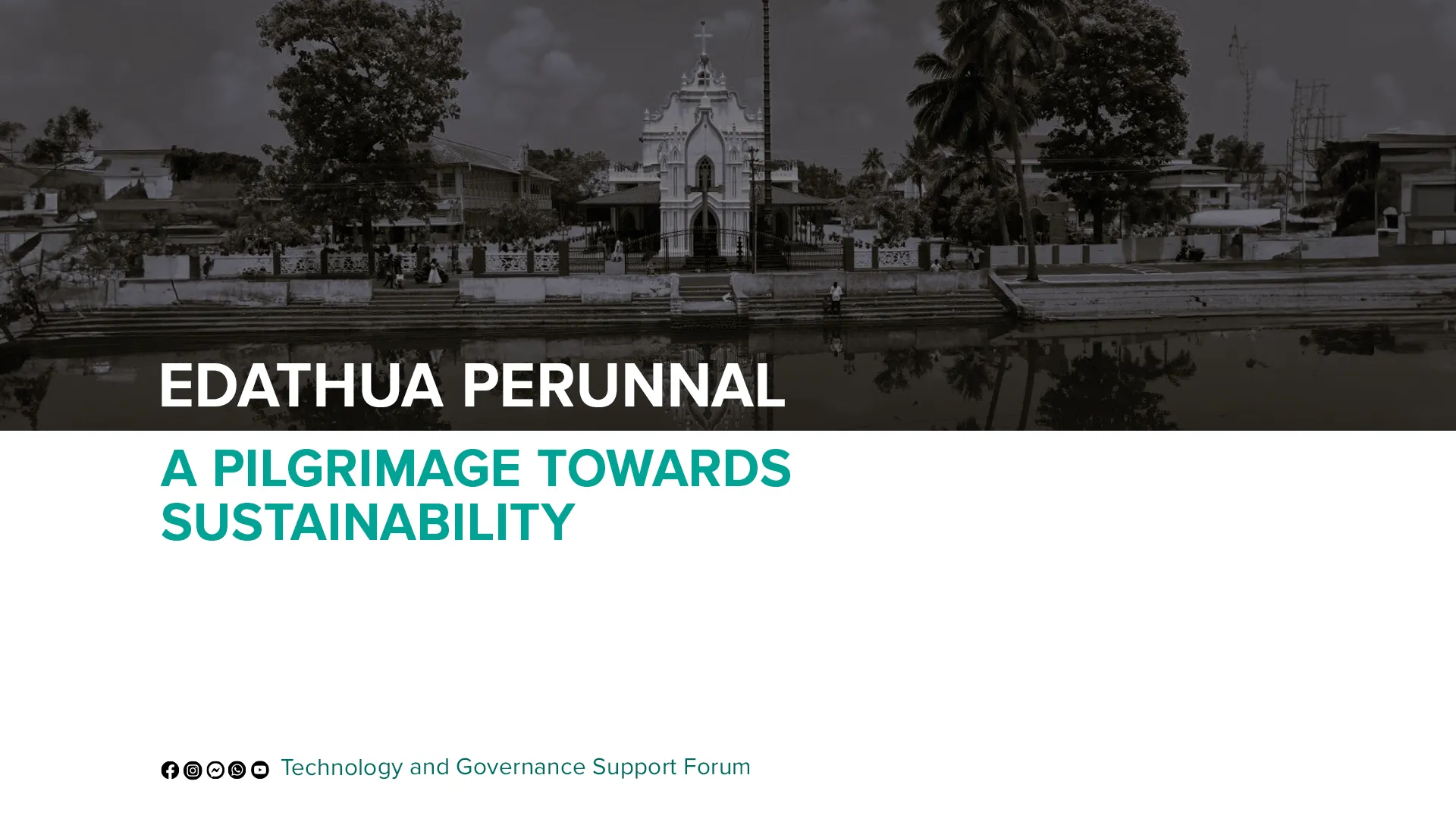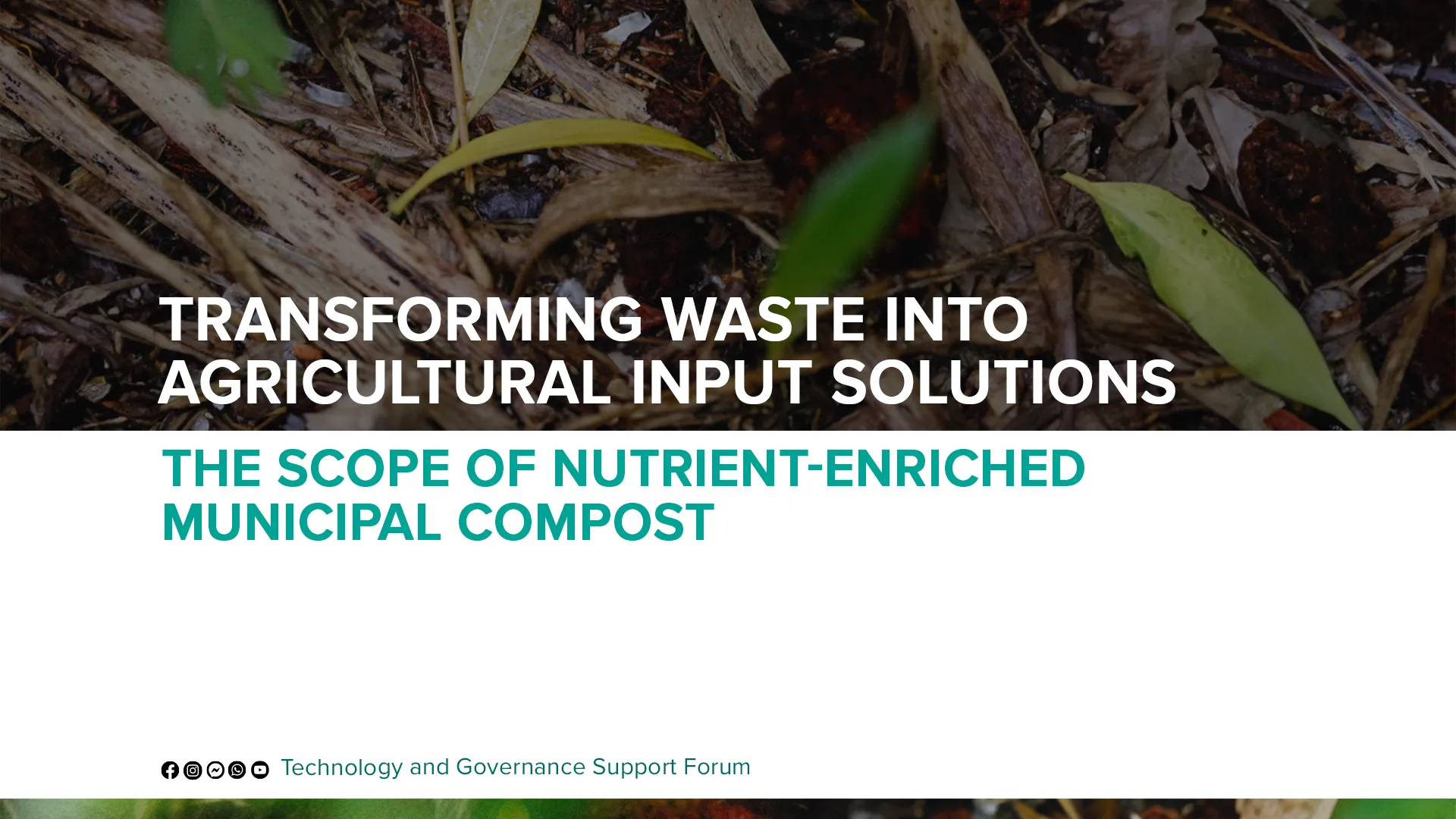Transforming Waste into Agricultural Input solutions: The Scope of Nutrient-Enriched Municipal Compost

In the pursuit of sustainable agriculture, innovative solutions that enhance soil fertility and crop productivity while mitigating environmental impacts are crucial. One such promising solution gaining traction is Nutrient-Enriched Municipal Solid Waste (MSW) Compost. This compost not only addresses waste management challenges but also enriches soil health, offering a sustainable alternative to chemical fertilisers.
The Rise of Nutrient-Enriched MSW Compost
Municipal solid waste (MSW) compost is increasingly recognized as a sustainable tool for urban waste management and agricultural enhancement. By diverting organic waste from landfills and transforming it into nutrient-rich compost, this approach supports a circular economy where waste becomes a valuable resource. Imagine a world where the organic waste from our homes and cities doesn’t just pile up in landfills but is transformed into a nutrient-rich fertiliser. This is the promise of nutrient-enriched MSW compost. By converting organic waste into a valuable agricultural input, we address two problems at once: reducing waste and enhancing soil fertility. Recent studies have highlighted the transformative potential of this compost, especially for rice cultivation.
The Science Behind Nutrient Enrichment
Nutrient enrichment of compost involves incorporating diverse organic materials and specific amendments to address nutrient deficiencies. This process ensures that compost not only decomposes effectively but also delivers a rich blend of nutrients essential for plant growth. A mix of kitchen scraps, garden waste, and manure provides a broad spectrum of nutrients. Each type of organic matter decomposes at a different rate, releasing nutrients progressively and creating a balanced nutrient profile. Regularly turning compost piles ensures adequate oxygen flow, which speeds up decomposition and makes nutrients more accessible. Aeration prevents the compost from becoming anaerobic, which can slow down the decomposition process and lead to foul odours. Additives like bone meal for phosphorus and kelp meal for potassium target specific nutrient gaps. These amendments boost the nutrient content of compost, making it a more effective fertiliser. Compost teas and worm castings introduce beneficial microorganisms and nutrients, enhancing nutrient cycling and plant health. Compost tea, a liquid extract of compost, can be sprayed on plants to provide immediate nutrient boosts and improve plant immunity. Keeping optimal moisture levels and monitoring pH are crucial for microbial activity and nutrient release. Proper maintenance ensures that the composting process proceeds efficiently and that the final product is of high quality. To further enhance compost quality, methods like adding rock phosphate, FeSO4, lime, cellulolytic fungi, clays, industrial wastes (e.g., red mud, fly ash), and minerals like zeolite or Ca-bentonite can be employed. Vermicomposting, using worms to decompose organic matter, also lowers the C/N ratio and improves compost nutrient profiles.
Growing Global Use and Adoption of MSW Compost
The global adoption of municipal solid waste (MSW) compost is on the rise as countries recognize its dual benefits in waste management and agriculture. This shift towards nutrient-enriched composting aligns with broader sustainability goals, supporting a circular economy where waste is repurposed as a valuable resource. For example, in the European Union, the use of composted organic materials in agriculture increased by 25% from 2010 to 2020, reflecting a significant commitment to sustainable practices (Eurostat). In the United States, the production of compost from MSW grew by 12% annually over the past decade, driven by both environmental regulations and market demand for organic fertilisers (EPA). This trend is mirrored in developing countries, where composting initiatives are being scaled up to tackle both waste management issues and agricultural productivity challenges. The expansion of MSW composting globally underscores its potential to transform waste into a critical input for sustainable agriculture.
Factors Influencing MSW Compost Composition
Several factors influence the composition and quality of MSW compost, impacting its effectiveness as an agricultural input. Processing technologies, such as aerobic and anaerobic composting methods, play a crucial role in determining the nutrient profile and stability of the compost. For instance, aerobic composting, which relies on oxygen, tends to produce compost with higher nutrient content and fewer pathogens compared to anaerobic methods. Feedstock characteristics, including seasonality, source variation, and maturation regimes, also affect compost quality. Seasonal variations can lead to differences in the organic matter available for composting, while the source of waste—such as residential, commercial, or agricultural origins—introduces variability in nutrient composition. Additionally, the maturation regime, or the length of time compost is allowed to stabilise, impacts its nutrient availability and phytotoxicity. Advanced composting facilities now incorporate technologies to monitor and control these variables, ensuring a consistent and high-quality product.
Advantages and Disadvantages of MSW Compost
MSW compost offers numerous advantages in agriculture, particularly in enhancing soil fertility and structure. The interplay of carbon, nitrogen, potassium and phosphorus cycles within compost contributes to its effectiveness. Carbon, in the form of organic matter, improves soil structure and water retention. Nitrogen, Potassium and Phosphorus, essential nutrients for plant growth, are released slowly from compost, providing a steady nutrient supply. Additionally, composting can help remediate pollutants by stabilising heavy metals and reducing the bioavailability of certain contaminants (USDA). However, the use of MSW compost is not without challenges. The presence of toxic elements, microplastics, and persistent organic pollutants can pose risks to soil health and crop safety. Studies have shown that while composting can reduce the concentration of some pollutants, others, such as certain heavy metals and microplastics, may persist and accumulate in the soil (Science Direct). Furthermore, improper composting practices can lead to the emission of greenhouse gases like methane and nitrous oxide, albeit at lower levels compared to landfilling organic waste (EPA).
Addressing Potential Risks
Addressing the potential risks associated with MSW compost requires stringent quality control measures and continuous monitoring. Composting facilities must implement rigorous screening processes to remove contaminants like plastics, metals, and glass before composting begins. Advanced technologies such as windrow turners, in-vessel composting systems, and biofilters can help mitigate odour issues and reduce pathogen levels, ensuring a safer end product. Moreover, regular testing for heavy metals, pathogens, and organic pollutants is crucial to maintaining compost quality and safety. Regulatory frameworks and guidelines, such as those provided by the US Composting Council and the European Compost Network, play a vital role in standardising compost quality and ensuring safe application in agriculture. By addressing these challenges, the use of nutrient-enriched MSW compost can be optimised, maximising its benefits for both agriculture and the environment.
Boosting Rice Yields with Enriched Compost: Insights from Bangladesh and Tamil Nadu
At Bangladesh Agricultural University, a team led by Marufa Sultana embarked on a mission to test the efficacy of nutrient-enriched municipal solid waste (MSW) compost on rice cultivation. The study aimed to enrich standard MSW compost with organic amendments like mustard oil cake (MOC), poultry manure (PM), cow dung (CD), and sugarcane press mud (SPM). The goal was to optimise the compost’s nutrient profile, particularly nitrogen (N), phosphorus (P), potassium (K), and sulphur (S), making it a potent alternative to chemical fertilisers. The researchers set up a comprehensive field experiment involving ten different treatments that combined enriched MSW compost with varying levels of chemical fertilisers. They monitored rice yield, nutrient uptake, and soil health indicators throughout the crop cycle. Statistical analyses, including ANOVA and Duncan’s multiple range test, provided a clear picture of which treatments were most effective. The results were promising: treatments that used a mix of 50% chemical fertilisers and 50% nutrient-enriched MSW compost consistently outperformed those that used only chemical fertilisers, with the highest grain yield recorded at 7.09 tons per hectare with MSW compost enriched with MOC and SPM in a specific ratio. The enriched compost significantly boosted the concentrations of N, P, K, and S in both rice grains and straw, showcasing improved nutrient availability and uptake efficiency. Post-harvest soil analysis showed enhanced soil organic matter and nutrient content, crucial for sustaining long-term soil fertility and productivity. By recycling organic waste, nutrient-enriched MSW compost reduces dependence on chemical fertilisers and addresses waste disposal challenges, promoting environmental sustainability.
Another study in Tamil Nadu explored the impact of enriched MSW compost (EMSWC) on soil macronutrients in rice fields. The researchers enriched MSW compost with poultry litter, spent wash, and a microbial consortium, aiming to significantly enhance its nutrient profile. The study revealed significant improvements: EMSWC combined with inorganic fertilisers increased soil ammonium nitrogen content, peaking at 38.87 mg/kg, and also elevated nitrate nitrogen levels. Treatments with EMSWC consistently showed higher levels of available phosphorus (up to 22.46 kg/ha) and potassium (up to 647 kg/ha) compared to controls and other fertiliser treatments. These findings underline the significant potential of nutrient-enriched MSW compost in improving soil fertility and crop yields, demonstrating its value as an effective and sustainable agricultural input. The results from both Bangladesh and Tamil Nadu studies highlight the transformative impact of using enriched MSW compost, providing strong evidence for its broader application in sustainable agriculture and waste management practices.
The Environmental and Economic Benefits
The integration of nutrient-enriched municipal solid waste (MSW) compost into agriculture and waste management holds immense promise, supported by compelling statistical insights across several key dimensions. Firstly, from an agricultural perspective, the global industry faces significant environmental challenges. Agriculture contributes up to 24% of total greenhouse gas emissions globally, predominantly through the use of chemical fertilisers and intensive farming practices (FAO). This reliance not only exacerbates climate change but also degrades soil quality, leading to erosion and nutrient runoff. However, there is a growing trend towards organic practices, with organic food sales in the United States alone reaching $56.4 billion in 2020, highlighting a shift towards more sustainable agricultural methods (Organic Trade Association).
Secondly, waste management presents another critical angle where nutrient-enriched MSW compost can make substantial contributions. Globally, municipal solid waste generation is projected to rise significantly, potentially reaching 3.40 billion metric tons by 2050, up from 2.01 billion metric tons in 2016 (World Bank). A substantial portion of this waste is organic material, which if composted, can be diverted from landfills where it would otherwise decompose anaerobically, producing methane—a greenhouse gas 25 times more potent than carbon dioxide over a 100-year period (EPA).
Moreover, the environmental benefits of composting extend beyond methane reduction. By enriching soil health through compost application, agricultural systems can enhance water retention, reduce erosion, and promote biodiversity (USDA). These improvements not only support more resilient farming practices but also contribute to sustainable land management and conservation efforts.
Economically, transitioning towards organic practices and integrating compost into agricultural systems can yield long-term cost savings. Studies indicate that reducing reliance on synthetic fertilisers and adopting composting can lead to reduced production costs while enhancing crop yields and soil fertility (Rodale Institute). In regions like Bangladesh and Tamil Nadu, where studies have demonstrated significant yield increases with nutrient-enriched MSW compost, there is potential to improve food security and livelihoods among farmers (Sultana et al., 2021; Ramadass & Palaniyandi, 2007).
Looking Ahead: The Future of Sustainable Agriculture

The integration of nutrient-enriched MSW compost into agricultural practices presents a promising path toward achieving sustainable development goals. By harnessing local organic resources, farmers can enhance soil health, increase crop yields, and reduce environmental impacts. This approach not only supports food security but also promotes a circular economy where waste is transformed into a valuable resource. Nutrient-enriched MSW compost represents a transformative step towards sustainable agriculture. It aligns ecological stewardship with agricultural productivity, offering a viable alternative to chemical fertilisers. By embracing enriched compost, we can reduce our environmental footprint, promote sustainable farming practices, and ensure a healthier planet for future generations.
In conclusion, the journey from waste to resource through nutrient-enriched MSW compost holds immense potential. By integrating this innovative approach into agricultural practices, we pave the way for a greener, more productive, and sustainable future. Let’s embrace this change and transform our agricultural systems for the better.
Author








